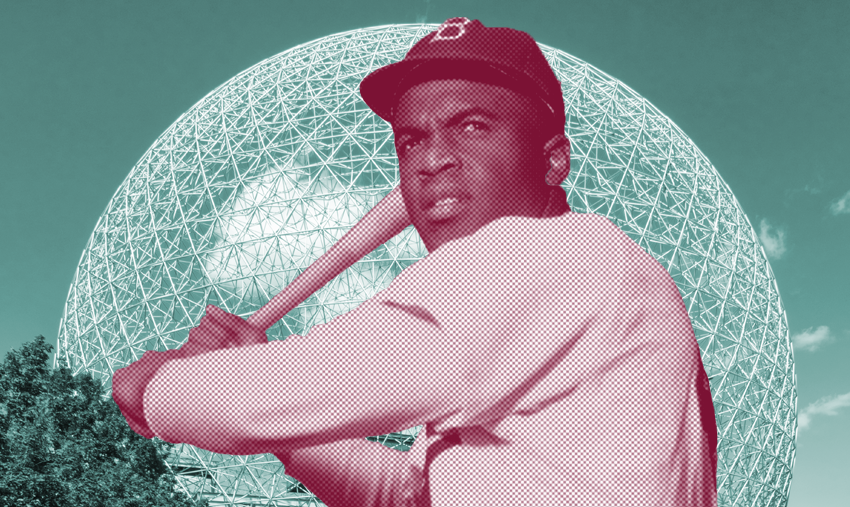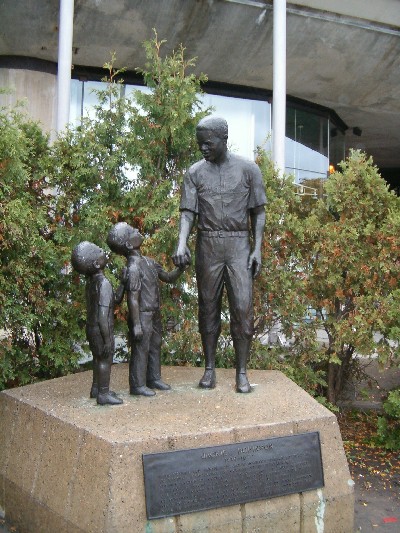Joyeux anniversaire, Jackie Robinson
On his 105th birthday, Montreal remembers a legend

Five years ago, when the world celebrated what would have been his 100th birthday, Jackie Robinson’s granddaughter Meta visited an unlikely, yet important place in Jackie’s life journey: Montreal, the French-speaking metropolis in Quebec, Canada. “I know that not only did he do well here, but he was embraced here,” Meta told a CBC reporter. “As you can see, Montreal continued to really embrace that legacy and really carry on the work that he has done here.”
An international cultural mecca and foodie paradise, Montreal is also a city of diehard sports fans, who still mourn the loss of their beloved Expos (shipped to Washington in 2004). They also fondly remember the Royals, their bygone AAA baseball team, which welcomed Jackie Robinson a year before he broke Major League Baseball’s color barrier.
Branch Rickey Jr. was president of the Dodgers at the time, and he knew Robinson’s contract would be controversial, hence the stop. Known at the time as Harlem of the North, Montreal had a thriving Black community, Black churches, a legendary jazz scene, and was generally more racially tolerant and progressive than much of the U.S. Robinson and his wife, Rachel, were quickly and warmly welcomed by both the Black and white communities. “We were greeted in Montreal with such warmth and dignity,” Rachel told a reporter in 2004. “The acceptance was so complete.”
Meanwhile in Sanford, Florida, the police chief threatened to cancel a Spring Training game if Robinson played – and that was the Royals’ home park. In Jacksonville, the stadium was padlocked and games suspended due to threats from the Ku Klux Klan. Even Robinson’s manager, Mississippi’s Clay Hopper, initially had concerns about coaching a Black man (he came around eventually).
Nonetheless, on April 18, 1946, Robinson became the first Black regular-season player in minor-league history, facing the Jersey City Giants and their crowd of nearly 52,000 spectators–more than double the usual capacity. Robinson treated them all with a preview of his 1947 MLB Rookie of the Year chops, going 4-for-5 with a home run, four runs scored, four RBIs, and two stolen bases as the Royals romped to a 14-1 victory.
After that homer–unlike the two men he had just batted in–on-deck hitter George “Shotgun” Shuba stepped over to shake Robinson’s hand. This became known as the “Handshake of the Century,” the first interracial handshake during a pro baseball game. (A statue has memorialized the moment in Shuba’s hometown of Youngstown, Ohio, since the 75th anniversary in 2021).
Back home in Montreal, Jackie quickly became a local hero. At the Royals’ home opener on May 1, the buzz around Delorimier Stadium was so great that it piqued the curiosity of another Montreal legend: the Canadiens’ future Hockey Hall of Famer, Maurice “Rocket” Richard.
By September, Robinson had keyed the Royals to a 100-54 record and the International League championship, leading the league with a .349 batting average and 116 runs across 124 games–not to mention 66 RBIs and 40 steals. “Ushers and police couldn’t keep the crowd from the field,” reporter Sam Maltin wrote after the title-clinching game. “When Robinson emerged from the clubhouse, men and women of all ages threw their arms around him, kissed him, and carried him around the field on their shoulders.”
His time in Montreal only lasted a year, but Jackie Robinson’s legacy lives on in the city. A plaque marks the Robinsons’ modest home from that year, remembering their contribution to the city, baseball, and civil rights. Delorimier Stadium was torn down in 1969, but there’s another plaque in front of a red backstop at the site. In front of the Expos’ former home, Olympic Stadium, stands a cast bronze statue of Robinson handing a baseball to two boys, and there several large murals of the Hall of Famer on buildings around the city.

In his 1972 autobiography, I Never Had It Made, Robinson wrote fondly about his time in the city, “As the plane roared skyward and the lights of Montréal twinkled and winked in the distance, I took one last look at this great city where I had found so much happiness. ‘I don’t care if I ever get to the majors,’ I told myself. ‘This is the city for me. This is paradise.’”
Jackie Robinson may be a great American treasure, but he holds a special place in the hearts and minds of Montrealers too – pour toujours.
